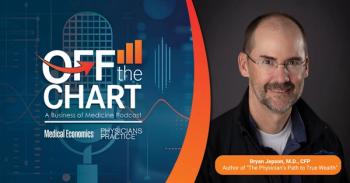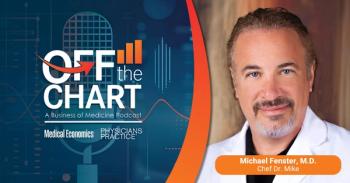
Basic Budgeting for Physicians
Your expertise in medicine is established; now brush up on your financial education.
Physicians may bring in sizeable paychecks, but that doesn't mean they're any better than the average Joe when it comes to crafting a personal budget.
Planning for retirement, college for their children, and paying down debt are not financial goals exclusive to physicians, but developing a plan for them can be a bit different.
"[Doctors] have acquired a lifestyle that is grander than your more typical American," says Henry Walker, president of Farmers & Merchants Bank, a Long Beach, Calif.-based community bank that specializes in working with physicians. "Because of their affluence and position, they like to maintain that lifestyle, but they have the same problems planning for retirement."
Much like individuals in any other profession, they're not always sure how much to save or the correct timing to buy a first home.
"There's the temptation to go out and enjoy the immediate fruits of their labor, but there's a danger in that," says Walker, who points out that physicians are earning less than they did 30 years ago.
Hire a planner
One key to a sound financial future is hiring a financial planner who can help develop a budget, says Walker. "I think doctors need to consider aligning themselves with good counselors. They need to be careful who they select."
He suggests asking for financial planner recommendations from other physicians. If asking colleagues proves fruitless, consider financial firms that cater to medical professionals. Often, Walker says, if a physician hires a trusted financial planner, that person can suggest other specialized professionals to aid with investing, stocks, and other financial needs.
Walker notes that years ago, many doctors chose to put their money into real estate, which didn't always produce the expected return. Now many are investing in surgery centers. In a changing economic climate, Walker suggests new revenue streams such as surgery centers may be appropriate to explore if physicians are comfortable with the financial risk involved.
"I think every doctor needs to evaluate their independent financial position and risk tolerance to determine if this type of investment is appropriate," Walker says. "There are many factors that need to be considered, including cash available, partnership interests, expected rate of return, time until retirement, and succession planning, to name a few."
A financial planner can sit down with a physician and show her various budgeting scenarios.
An important part of budgeting is tracking everyday expenses - though not all doctors are willing to undergo that exercise. Robert Tucker, a retired physician and accredited investment fiduciary with Plancorp, a financial planning and management firm in St. Louis, says it doesn't have to be time consuming, particularly if the focus is on tracking broad categories such as food, shelter, clothing, and entertainment - as opposed to each $5 purchase.
"Most charge or use a debit card, so you can get a pretty good idea by just looking at statements. Then it's not tedious and it can really be meaningful," says Tucker, who is also a contributor to Physicians Practice's blog, Practice Notes.
Build savings, investigate insurance
Once physicians begin practicing, they should plan to quickly put aside at least six months' income as a reserve fund - ideally, prior to major purchases such as homes or cars.
"I don't find that [doctors] are better at saving," says Ara Oghoorian, founder and president of ACap Asset Management, Inc., a California-based financial advisory firm for medical professionals. "They're similar to attorneys in that they spent a lot of years in school. They spent so long depriving themselves while in school so there's this tendency to want to spend."
He typically tells new physician clients to wait on buying that luxury car. Oghoorian says it's critical that a financial planner first examine current spending to determine if a $1,000 monthly car payment is feasible, particularly for recent medical school graduates with salaries that initially seem very large in comparison to the lifestyle they previously could afford.
In addition, physicians should have some level of insurance that will protect them and their families in the event of disability or death. However, they should be cautious in choosing insurance options, particularly when it comes to life insurance.
"The number one thing I see is a physician buying expensive and unnecessary insurance that they're locked into for a number of years," says Oghoorian.
A number of his clients (some without dependents) were previously paying up to $700 a month for life insurance policies while skimping on their savings or 401(k)s. In some cases, those insurance plans had no cash value because the doctors had not paid into them long enough.
"It all depends on a doctor's stage of career," says Oghoorian. "If a physician is in their early 30s or late 20s, they're still young. If they're not married and no one is relying on their income it doesn't make sense to have [life] insurance, since life insurance protects against mortality."
Instead, he suggests investing in a matched 401(k) plan, particularly for younger physicians, though he encourages contributions regardless of career stage. If a 401(k) plan is not available, Oghoorian recommends putting money that was planned for life insurance into retirement savings instead.
Look ahead to retirement
The numbers for retirement savings goals are largely subjective. The decision hinges on a physician's lifestyle, planned retirement age, and whether the goal is to maintain the current lifestyle after retirement. For physicians who live modestly and have higher salaries, saving 5 percent to 7 percent annually could be enough.
Lars Landrie, a principal with Seattle, Wash.-based Moss Adams Wealth Advisors, says it would be even better if doctors can save 15 percent to 20 percent of their salaries each year, especially among those who have been practicing for a number of years.
Some physicians are spending money they should be saving, says Landrie, pointing out it is "a big eye opener" for physicians to realize they could be hampering their retirement by saving too little.
Prepare for, pay off college
Physicians haven't forgotten the significant cost of college, and many hope to cover the cost in full for their children. The amount to sock away can be tricky depending on where physicians expect their kids to attend college. Oghoorian notes that one of his physician clients is putting aside $1.2 million, enough to allow his four children to attend a private California college.
"One thing we see among physician groups is that a lot of them as they get a little older - in their late 40s or early 50s - think about what they went through and maybe they did not get much help with college," says Landrie. "So a lot of them try to cover the entire college expense for their kids. They want to give them a fresh start."
Landrie feels that physicians often hope their children will attend more prestigious schools or seek advanced degrees, exponentially increasing the amount they need to save for education.
In addition to saving for their children's college years, many doctors are also still working to pay off their own loans from medical school. Doctors should work toward paying off their own educational loans within 20 years, though 10 years is ideal, suggests Landrie.
"It's critical to doctors as they establish their practice that they work to get out of debt quickly, if they have any," says Walker. "Medical school can put them in a fair amount of debt so they should keep living expenses to a minimum."
Whittle long-term debts
Walker says the same goes for purchasing a first home. If it's financially feasible, pay off the house early or opt for a 15-year home loan instead of the typical 30-year mortgage. Owning a home outright lessens potential financial struggles during an emergency such as extended sick leave.
Physicians also should be careful of consumer debt by being cautious not to purchase second homes they can't afford, running up credit cards they don't intend to pay off monthly, or buying extravagant cars that may damage their long-term saving goals. Walker suggests physicians purchase a car that they can afford to pay off within three years to four years as opposed to interest-heavy six-year car loans.
"Financial companies will easily give them credit because they are doctors and they consider them low risk," Walker says. "If they're not aware of this trap, they can easily overextend themselves much more than other Americans."
Deanna Morey is a freelance writer based in Austin, Texas, specializing in healthcare, government, and education. Her work has appeared in the Orlando Medical News, the Houston Chronicle, and Seasons Magazine. She can be reached at editor@physicianspractice.com.
This article originally appeared in the January 2014 issue of Physicians Practice.
Newsletter
Optimize your practice with the Physicians Practice newsletter, offering management pearls, leadership tips, and business strategies tailored for practice administrators and physicians of any specialty.








